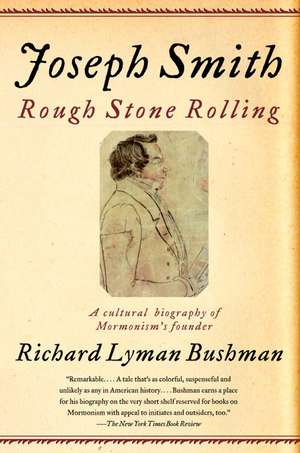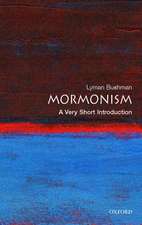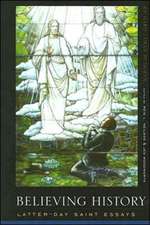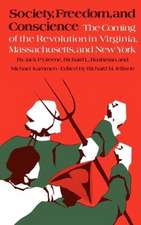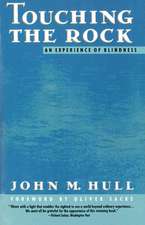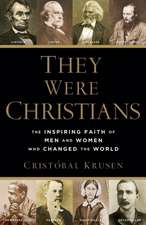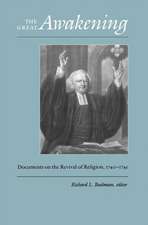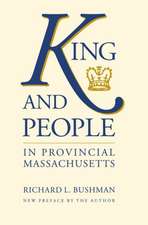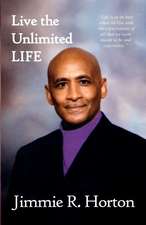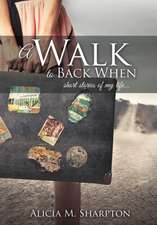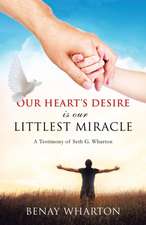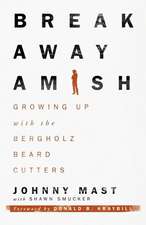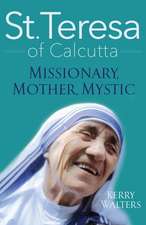Joseph Smith: Rough Stone Rolling
Autor Richard Lyman Bushman Jed Woodworthen Limba Engleză Paperback – 28 feb 2007
Preț: 151.99 lei
Nou
Puncte Express: 228
Preț estimativ în valută:
29.09€ • 30.05$ • 24.21£
29.09€ • 30.05$ • 24.21£
Carte disponibilă
Livrare economică 05-19 martie
Preluare comenzi: 021 569.72.76
Specificații
ISBN-13: 9781400077533
ISBN-10: 1400077532
Pagini: 740
Ilustrații: 16 PP. B&W; 9 MAPS
Dimensiuni: 155 x 229 x 38 mm
Greutate: 0.84 kg
Editura: Vintage Books USA
ISBN-10: 1400077532
Pagini: 740
Ilustrații: 16 PP. B&W; 9 MAPS
Dimensiuni: 155 x 229 x 38 mm
Greutate: 0.84 kg
Editura: Vintage Books USA
Notă biografică
Richard L. Bushman was born in Salt Lake City, Utah, in 1931. He took his B.A., M.A., and PhD. degrees at Harvard University. He has taught at Brigham Young University, Boston University, University of Delaware, and Columbia University, where he is currently Gouverneur Morris Professor of History, Emeritus. His previous books are From Puritan to Yankee: Character and Social Order in Connecticut, 1690-1765 (1967), Joseph Smith and the Beginnings of Mormonism (1984), King and People in Provincial Massachusetts (1985), and The Refinement of America: Persons, Houses, and Cities (1992).
Extras
THE JOSEPH SMITH FAMILY
to 1816
My Last request & charge is, that you will Live together in an undivided bond of Love; you are maney of you, and if you Join together as one man, you need not want aney thing; what counsil, what comfort, what money, what friends may you not help your Selves unto, if you will, all as one contribute your aids.
asael smith, “A few words of advice” (1799)
Lucy Mack Smith bade farewell to her sons Joseph and Hyrum a few days after their deaths in June 1844. Joseph’s secretary, Willard Richards, and their brother Samuel had brought the bodies back from Carthage to Nauvoo, and after the corpses were washed and dressed in burial clothes, the Smith family was admitted to the room. “I had for a long time braced every nerve,” their mother wrote,
roused every energy of my soul, and called upon God to strengthen me; but when I entered the room, and saw my murdered sons extended both at once before my eyes, and heard the sobs and groans of my family, and the cries of “Father! Husband! Brothers!” from the lips of their wives, children, brother, and sisters, it was too much, I sank back, crying to the Lord, in the agony of my soul, “My God, my God, why hast thou forsaken this family!”
Six months later, Lucy began a narrative of the early life of Joseph Smith. She was sixty-nine, afflicted with disease and saddened by “the cruelty of an ungodly and hard hearted world.” Within a month she had lost three sons: Joseph and Hyrum to vigilante bullets and Samuel to a fever contracted while escaping the mob. Of her seven sons, only the unstable William survived. Her husband, Joseph Sr., had died four years earlier, and she lived with her daughter, another Lucy, and later with Joseph’s widow, Emma, who was carrying her husband’s unborn son.
In this troubled and uncertain moment, the question of the Prophet’s successor remained unsettled. Lucy’s son William was soon to be among the contenders. The “Gentile” countryside expected the Mormon kingdom to crumble and the Saints to disperse. When they proved inconveniently adamant, the citizens forced the Mormons to leave. But trouble did not slow Lucy’s dictation to Martha and Howard Coray through the winter of 1844–45. One crisply told story after another covered the pages, making her narrative the central source for the early life of Joseph Smith.
Lucy Smith reacted to the sorrows and distresses of her life with indignation, not regret. Recollecting the murder of her sons, she wrote that “my blood curdles in my veins.” At the close of the book, she consigned the malicious and indifferent government officials who had darkened her family’s lives—the governors Lilburn W. Boggs, Thomas Carlin, and Thomas Ford, and President Martin Van Buren—to the judgment of God. She was a proud, high-strung woman, belligerent, capable of anger, grief, and sublime confidence in the final triumph of the innocent. She concluded her account with a lofty judgment: “And I shall leave the world to judge, as seemeth them good, concerning what I have written. But this much I will say, that the testimony which I have given is true, and will stand for ever.”
Lucy did not mention the name of Joseph Smith, Jr., until page 56 of her record. As she told the story, no signs or portents accompanied the birth of her most famous son. She said quite simply that “in the meantime we had a son, whom we called Joseph, after the name of his father; he was born December 23, 1805. I shall speak of him more particularly by and by.” Joseph’s revelations and writings, his part in constructing the city of Nauvoo, the tens of thousands of followers, and his national notoriety—none of this overwhelmed Lucy Smith’s story.
The Smith family stood at the center. Lucy’s pride was the pride of family. When she saw the bodies of Hyrum and Joseph, she spontaneously asked why had God “forsaken this family.” Her narrative began with her father, Solomon, and devoted six chapters to her brothers and sisters before telling about herself. Lucy calculated that six Smith martyrs had fallen because of persecution: Joseph Sr.; sons Don Carlos, Hyrum, and Samuel; William’s wife Caroline; and Joseph the Prophet.
She had little worldly to boast of. Lucy knew of the “attention and respect which are ever shown to those who live in fine circumstances,” but of her sister Lydia, who “sought riches and obtained them,” Lucy wrote but two paragraphs: not that Lydia was less loved, “but she seemed to float more with the stream of common events.”7 Lucy’s pride arose from the way her family met adversity. Joseph and Hyrum lay in triumph in their coffins because justice and charity gave them power over their enemies. She honored those who overcame. Her narrative turned the misfortunes of the Smith family into exemplifications of family character.
solomon and lucy mack
Lucy Mack Smith was the youngest of eight children born to Solomon Mack and Lydia Gates. Lucy briefly mentioned her father’s adventures in the French and Indian War and the American Revolution, and then said little more about him. He was absent for years at a time while Lucy was growing up, and until he experienced a drastic change of heart late in life, he was preoccupied solely with the pursuit of wealth. Solomon was born September 15, 1732, in Lyme, Connecticut, the grandson of John Mack, one of Lyme’s prospering traders. When Solomon was four, his father, Ebenezer Mack, lost the land he had inherited in Lyme, and Solomon was bound out to a hard-hearted and miserly farmer, about whom he wrote in his memoir:
I was treated by my Master as his property and not as his fellow mortal; he taught me to work, and was very careful that I should have little or no rest. . . . His whole attention was taken up on the pursuits of the good things of this world; wealth was his supreme object. I am afraid gold was his God.
Solomon grew up “like the wild ass’s colt,” feeling “no obligation with regard to society.”
Free at age twenty-one, Solomon Mack tried “to make myself great and happy, in the way I was educated,” by accumulating property. Defeated in one venture after another, wounded by falling trees and spills from horses, afflicted with fits and permanently lame, shipwrecked, betrayed by business associates, he always recovered his health and courage and set forth on new undertakings. He enlisted for service in the French and Indian War and with his discharge pay purchased a farm in Lyme. In 1759, at twenty-six, he married Lydia Gates, daughter of Deacon Daniel Gates in nearby East Haddam. But then, carried away by ambition, he purchased rights to 1,600 acres in New York, freighted a vessel for New York City, and sold his Lyme property to purchase a proprietary right in New Hampshire. By July 8, 1775, when Lucy Mack was born in Gilsum, New Hampshire, Solomon had eight children, had cleared scores of acres and owned hundreds more, risked his capital in a variety of ventures, and yet despite all his efforts, “the Lord would not suffer me to prosper.”
The battle of Bunker Hill took place in Boston three weeks before Lucy’s birth. George Washington’s greatest need was for supplies. Sensing a renewal of the opportunities of the French and Indian War, Solomon learned from his brother-in-law in Connecticut how to make saltpeter for gunpowder and earned a dollar a day teaching the art from town to town. During the Revolution, Solomon was one of seven Gilsum men to enlist in the army. He alternated between enlistments and profit-making enterprises like carting the army’s baggage. In 1778, he signed on with the crew of a privateer.
For fourteen years, Solomon lived at home less than half the time. Instead of satisfying himself with a small farmstead, the traditional base for a household economy, he reached for one handhold after another in the larger economy. After the war he freighted a vessel bound for Liverpool, Nova Scotia, sailed with a fishing schooner, and ended up purchasing it after it was damaged in a hurricane and abandoned. He and a son carried passengers to New London, Connecticut, and conducted a coasting trade between Halifax, Nova Scotia, and St. John, New Brunswick. For four years Solomon heard nothing from his family. Finally around 1788, he returned home with little to show for his exertions. He was fifty-six, and after all his “hard labor and perplexity of mind, I had won nothing.” “The best of my days were past and gone and had to begin entirely anew.” He discovered on his return that Lydia and the children had been turned out of their house in Montague, Massachusetts. A misunderstanding on an old debt from Lyme and the underhanded dealings of one John McCurdy, who fell heir to Solomon’s promissory note, led to the ejection. This news took the heart out of him. “I now thought all was gone, and I did not care whether I lived or died.”
Solomon’s doleful account of his life should not be read as a narrative of failure. He wrote his story after his religious conversion in 1811 to show that God had repeatedly humbled him and taught him the vanity of the world, and yet he had remained deaf to the Lord’s call. Solomon’s purpose required him to emphasize defeat and despair. Although they suffered reverses, the Mack family did not dwell in mean poverty. At various times, they owned farms and houses. Solomon had the capital to purchase land, freight vessels, buy a schooner, and to owe and be owed hundreds of dollars. In 1786, his daughter Lydia married Samuel Bill from one of Gilsum’s prominent families. Solomon’s disappointments never broke his spirit. After lamenting that he cared not whether he lived or died, he reported that “I went to work and shifted from plan to plan till at length I moved to Tunbridge.” Neither failure, old age, nor broken bones defeated him. The significance of Solomon’s account lies less in his actual success or failure in acquiring wealth than in his sense of life as made up of toil, hurt, defeat, and death. Outside of the war episodes, there is no happiness or triumph until the end, when “God did appear for me and took me out of the horrible pit and mirey clay, and set my feet on the rock of Christ Jesus.”
Much of Solomon’s grim endurance passed to his daughter. Lucy measured the early years not by happy friendships or childish adventures but by deaths and illnesses. Her memories, she said, were “engraved upon my heart with a pen of Iron.” When a chance meeting reminded her of her youth, the thought would come to her, “ ‘The friends of my youth! where are they?’ The tomb replies, ‘here are they!’ ” Lucy’s life could be recounted as a series of losses. When she was three, Solomon was carried home half-dead from a falling tree. Later she watched while he suffered from a waterwheel fall and then from bodily fits caused by a blow on the head from a tree limb. Solomon left for Nova Scotia when Lucy was about eight. Soon after, her mother suffered a “severe fit of sickness” and came so near death that, in the absence of Solomon, she assigned eight-year-old Lucy to her brother Stephen for safekeeping. When Lucy was about fourteen, her married sister Lovisa fell ill with consumption, and for five years, either Lovisa or Lovina, a year younger and stricken with the same disease, hovered on the edge of death.
At age sixteen or seventeen Lucy was able to carry Lovina, then twenty-nine, from chair to bed. As Lovina died, she told Lucy of the cold creeping into her fingers and face. A few months later, in 1794, Lovisa’s consumption flared up after a three-year remission. Solomon went at once to South Hadley, Massachusetts, where she lived with her husband, and tried to bring her back to Gilsum, but she died in an inn on the way home. Lucy’s “mournful recital” evoked feelings that “must last while life endures.” In summing up her early life, Lucy spoke only of these illnesses and deaths.
Probably in 1794, when Lucy was nineteen, grief began to prey upon her. “I was pensive and melancholy, and often in my reflections I thought that life was not worth possessing.” Depressed and restless, Lucy sought comfort in religion: “I determined to obtain that which I had heard spoken of so much from the pulpit—a change of heart.” She gave herself to Bible reading and prayer but stumbled over one obstacle. “If I remain a member of no church, all religious people will say I am of the world; and if I join some one of the different denominations, all the rest will say I am in error. No church will admit that I am right, except the one with which I am associated.”
Her father had no answers. At sixty-two, he still sought happiness in an elusive prosperity, the false hope of his faithless upbringing. Lucy’s mother, Lydia, reared in a deacon’s house, joined the Congregational church at age thirty after she married Solomon. He gave her full credit for instructing the children in habits of “piety, gentleness, and reflection,” and for calling them together morning and evening to pray. Lucy said that all of her religious instruction came from her “pious and affectionate” mother.
The Mack children bore her imprint. As Lovina and Lovisa approached death, they warned their hearers to prepare for eternity. The oldest son, Jason, became a lay preacher at twenty, and by the end of his life was practicing faith healings and “holding meetings, day and night, from place to place.” He became a religious seeker before he was sixteen, pursuing the spiritual gifts of early Christianity outside of established churches. Religious currents ran deep in Lucy. She believed that God had healed her sister, Lydia, and her mother, and she solemnly recorded the account of Lovisa’s vision of “the Saviour, as through a veil.” Her sisters’ deaths led her thoughts to eternity, judgment, and the worthlessness of life. But the only mention of a church in Lucy’s childhood reminiscences occurs in the reference to Lovisa after her marriage to Joseph Tuttle. Lucy groped through her depression looking for a church and a change of heart and found nothing. Mack religion was family religion, and nothing outside the family satisfied her.
From the Hardcover edition.
to 1816
My Last request & charge is, that you will Live together in an undivided bond of Love; you are maney of you, and if you Join together as one man, you need not want aney thing; what counsil, what comfort, what money, what friends may you not help your Selves unto, if you will, all as one contribute your aids.
asael smith, “A few words of advice” (1799)
Lucy Mack Smith bade farewell to her sons Joseph and Hyrum a few days after their deaths in June 1844. Joseph’s secretary, Willard Richards, and their brother Samuel had brought the bodies back from Carthage to Nauvoo, and after the corpses were washed and dressed in burial clothes, the Smith family was admitted to the room. “I had for a long time braced every nerve,” their mother wrote,
roused every energy of my soul, and called upon God to strengthen me; but when I entered the room, and saw my murdered sons extended both at once before my eyes, and heard the sobs and groans of my family, and the cries of “Father! Husband! Brothers!” from the lips of their wives, children, brother, and sisters, it was too much, I sank back, crying to the Lord, in the agony of my soul, “My God, my God, why hast thou forsaken this family!”
Six months later, Lucy began a narrative of the early life of Joseph Smith. She was sixty-nine, afflicted with disease and saddened by “the cruelty of an ungodly and hard hearted world.” Within a month she had lost three sons: Joseph and Hyrum to vigilante bullets and Samuel to a fever contracted while escaping the mob. Of her seven sons, only the unstable William survived. Her husband, Joseph Sr., had died four years earlier, and she lived with her daughter, another Lucy, and later with Joseph’s widow, Emma, who was carrying her husband’s unborn son.
In this troubled and uncertain moment, the question of the Prophet’s successor remained unsettled. Lucy’s son William was soon to be among the contenders. The “Gentile” countryside expected the Mormon kingdom to crumble and the Saints to disperse. When they proved inconveniently adamant, the citizens forced the Mormons to leave. But trouble did not slow Lucy’s dictation to Martha and Howard Coray through the winter of 1844–45. One crisply told story after another covered the pages, making her narrative the central source for the early life of Joseph Smith.
Lucy Smith reacted to the sorrows and distresses of her life with indignation, not regret. Recollecting the murder of her sons, she wrote that “my blood curdles in my veins.” At the close of the book, she consigned the malicious and indifferent government officials who had darkened her family’s lives—the governors Lilburn W. Boggs, Thomas Carlin, and Thomas Ford, and President Martin Van Buren—to the judgment of God. She was a proud, high-strung woman, belligerent, capable of anger, grief, and sublime confidence in the final triumph of the innocent. She concluded her account with a lofty judgment: “And I shall leave the world to judge, as seemeth them good, concerning what I have written. But this much I will say, that the testimony which I have given is true, and will stand for ever.”
Lucy did not mention the name of Joseph Smith, Jr., until page 56 of her record. As she told the story, no signs or portents accompanied the birth of her most famous son. She said quite simply that “in the meantime we had a son, whom we called Joseph, after the name of his father; he was born December 23, 1805. I shall speak of him more particularly by and by.” Joseph’s revelations and writings, his part in constructing the city of Nauvoo, the tens of thousands of followers, and his national notoriety—none of this overwhelmed Lucy Smith’s story.
The Smith family stood at the center. Lucy’s pride was the pride of family. When she saw the bodies of Hyrum and Joseph, she spontaneously asked why had God “forsaken this family.” Her narrative began with her father, Solomon, and devoted six chapters to her brothers and sisters before telling about herself. Lucy calculated that six Smith martyrs had fallen because of persecution: Joseph Sr.; sons Don Carlos, Hyrum, and Samuel; William’s wife Caroline; and Joseph the Prophet.
She had little worldly to boast of. Lucy knew of the “attention and respect which are ever shown to those who live in fine circumstances,” but of her sister Lydia, who “sought riches and obtained them,” Lucy wrote but two paragraphs: not that Lydia was less loved, “but she seemed to float more with the stream of common events.”7 Lucy’s pride arose from the way her family met adversity. Joseph and Hyrum lay in triumph in their coffins because justice and charity gave them power over their enemies. She honored those who overcame. Her narrative turned the misfortunes of the Smith family into exemplifications of family character.
solomon and lucy mack
Lucy Mack Smith was the youngest of eight children born to Solomon Mack and Lydia Gates. Lucy briefly mentioned her father’s adventures in the French and Indian War and the American Revolution, and then said little more about him. He was absent for years at a time while Lucy was growing up, and until he experienced a drastic change of heart late in life, he was preoccupied solely with the pursuit of wealth. Solomon was born September 15, 1732, in Lyme, Connecticut, the grandson of John Mack, one of Lyme’s prospering traders. When Solomon was four, his father, Ebenezer Mack, lost the land he had inherited in Lyme, and Solomon was bound out to a hard-hearted and miserly farmer, about whom he wrote in his memoir:
I was treated by my Master as his property and not as his fellow mortal; he taught me to work, and was very careful that I should have little or no rest. . . . His whole attention was taken up on the pursuits of the good things of this world; wealth was his supreme object. I am afraid gold was his God.
Solomon grew up “like the wild ass’s colt,” feeling “no obligation with regard to society.”
Free at age twenty-one, Solomon Mack tried “to make myself great and happy, in the way I was educated,” by accumulating property. Defeated in one venture after another, wounded by falling trees and spills from horses, afflicted with fits and permanently lame, shipwrecked, betrayed by business associates, he always recovered his health and courage and set forth on new undertakings. He enlisted for service in the French and Indian War and with his discharge pay purchased a farm in Lyme. In 1759, at twenty-six, he married Lydia Gates, daughter of Deacon Daniel Gates in nearby East Haddam. But then, carried away by ambition, he purchased rights to 1,600 acres in New York, freighted a vessel for New York City, and sold his Lyme property to purchase a proprietary right in New Hampshire. By July 8, 1775, when Lucy Mack was born in Gilsum, New Hampshire, Solomon had eight children, had cleared scores of acres and owned hundreds more, risked his capital in a variety of ventures, and yet despite all his efforts, “the Lord would not suffer me to prosper.”
The battle of Bunker Hill took place in Boston three weeks before Lucy’s birth. George Washington’s greatest need was for supplies. Sensing a renewal of the opportunities of the French and Indian War, Solomon learned from his brother-in-law in Connecticut how to make saltpeter for gunpowder and earned a dollar a day teaching the art from town to town. During the Revolution, Solomon was one of seven Gilsum men to enlist in the army. He alternated between enlistments and profit-making enterprises like carting the army’s baggage. In 1778, he signed on with the crew of a privateer.
For fourteen years, Solomon lived at home less than half the time. Instead of satisfying himself with a small farmstead, the traditional base for a household economy, he reached for one handhold after another in the larger economy. After the war he freighted a vessel bound for Liverpool, Nova Scotia, sailed with a fishing schooner, and ended up purchasing it after it was damaged in a hurricane and abandoned. He and a son carried passengers to New London, Connecticut, and conducted a coasting trade between Halifax, Nova Scotia, and St. John, New Brunswick. For four years Solomon heard nothing from his family. Finally around 1788, he returned home with little to show for his exertions. He was fifty-six, and after all his “hard labor and perplexity of mind, I had won nothing.” “The best of my days were past and gone and had to begin entirely anew.” He discovered on his return that Lydia and the children had been turned out of their house in Montague, Massachusetts. A misunderstanding on an old debt from Lyme and the underhanded dealings of one John McCurdy, who fell heir to Solomon’s promissory note, led to the ejection. This news took the heart out of him. “I now thought all was gone, and I did not care whether I lived or died.”
Solomon’s doleful account of his life should not be read as a narrative of failure. He wrote his story after his religious conversion in 1811 to show that God had repeatedly humbled him and taught him the vanity of the world, and yet he had remained deaf to the Lord’s call. Solomon’s purpose required him to emphasize defeat and despair. Although they suffered reverses, the Mack family did not dwell in mean poverty. At various times, they owned farms and houses. Solomon had the capital to purchase land, freight vessels, buy a schooner, and to owe and be owed hundreds of dollars. In 1786, his daughter Lydia married Samuel Bill from one of Gilsum’s prominent families. Solomon’s disappointments never broke his spirit. After lamenting that he cared not whether he lived or died, he reported that “I went to work and shifted from plan to plan till at length I moved to Tunbridge.” Neither failure, old age, nor broken bones defeated him. The significance of Solomon’s account lies less in his actual success or failure in acquiring wealth than in his sense of life as made up of toil, hurt, defeat, and death. Outside of the war episodes, there is no happiness or triumph until the end, when “God did appear for me and took me out of the horrible pit and mirey clay, and set my feet on the rock of Christ Jesus.”
Much of Solomon’s grim endurance passed to his daughter. Lucy measured the early years not by happy friendships or childish adventures but by deaths and illnesses. Her memories, she said, were “engraved upon my heart with a pen of Iron.” When a chance meeting reminded her of her youth, the thought would come to her, “ ‘The friends of my youth! where are they?’ The tomb replies, ‘here are they!’ ” Lucy’s life could be recounted as a series of losses. When she was three, Solomon was carried home half-dead from a falling tree. Later she watched while he suffered from a waterwheel fall and then from bodily fits caused by a blow on the head from a tree limb. Solomon left for Nova Scotia when Lucy was about eight. Soon after, her mother suffered a “severe fit of sickness” and came so near death that, in the absence of Solomon, she assigned eight-year-old Lucy to her brother Stephen for safekeeping. When Lucy was about fourteen, her married sister Lovisa fell ill with consumption, and for five years, either Lovisa or Lovina, a year younger and stricken with the same disease, hovered on the edge of death.
At age sixteen or seventeen Lucy was able to carry Lovina, then twenty-nine, from chair to bed. As Lovina died, she told Lucy of the cold creeping into her fingers and face. A few months later, in 1794, Lovisa’s consumption flared up after a three-year remission. Solomon went at once to South Hadley, Massachusetts, where she lived with her husband, and tried to bring her back to Gilsum, but she died in an inn on the way home. Lucy’s “mournful recital” evoked feelings that “must last while life endures.” In summing up her early life, Lucy spoke only of these illnesses and deaths.
Probably in 1794, when Lucy was nineteen, grief began to prey upon her. “I was pensive and melancholy, and often in my reflections I thought that life was not worth possessing.” Depressed and restless, Lucy sought comfort in religion: “I determined to obtain that which I had heard spoken of so much from the pulpit—a change of heart.” She gave herself to Bible reading and prayer but stumbled over one obstacle. “If I remain a member of no church, all religious people will say I am of the world; and if I join some one of the different denominations, all the rest will say I am in error. No church will admit that I am right, except the one with which I am associated.”
Her father had no answers. At sixty-two, he still sought happiness in an elusive prosperity, the false hope of his faithless upbringing. Lucy’s mother, Lydia, reared in a deacon’s house, joined the Congregational church at age thirty after she married Solomon. He gave her full credit for instructing the children in habits of “piety, gentleness, and reflection,” and for calling them together morning and evening to pray. Lucy said that all of her religious instruction came from her “pious and affectionate” mother.
The Mack children bore her imprint. As Lovina and Lovisa approached death, they warned their hearers to prepare for eternity. The oldest son, Jason, became a lay preacher at twenty, and by the end of his life was practicing faith healings and “holding meetings, day and night, from place to place.” He became a religious seeker before he was sixteen, pursuing the spiritual gifts of early Christianity outside of established churches. Religious currents ran deep in Lucy. She believed that God had healed her sister, Lydia, and her mother, and she solemnly recorded the account of Lovisa’s vision of “the Saviour, as through a veil.” Her sisters’ deaths led her thoughts to eternity, judgment, and the worthlessness of life. But the only mention of a church in Lucy’s childhood reminiscences occurs in the reference to Lovisa after her marriage to Joseph Tuttle. Lucy groped through her depression looking for a church and a change of heart and found nothing. Mack religion was family religion, and nothing outside the family satisfied her.
From the Hardcover edition.
Recenzii
“Remarkable. . . . A tale that’s as colorful, suspenseful and unlikely as any in American history...Bushman earns a place for his biography on the very short shelf reserved for books on Mormonism with appeal to initiates and outsiders, too.”—The New York Times Book Review“A fascinating definitive biography. . . . Stirs deeper questions about American religious convictions and how they shape lives and culture.” —The Christian Science Monitor“An exhaustively researched and beautifully written biography of Mormonism’s enigmatic founder.”—Christianity Today"Fascinating. . . .Bushman captures all the harrowing events of Smith's short life, rife with converts and cabals, while meticulously dissecting the revelations that continue to haunt the Smith story." —The Providence Journal“Well-researched and lucidly written. . . . An excellent source for learning about the Mormon faith.” —The St. Louis Post-Dispatch
Descriere
In this well-researched biography, an esteemed American cultural historian and a practicing Mormon tells how Joseph Smith formed a new religion from the ground up.
